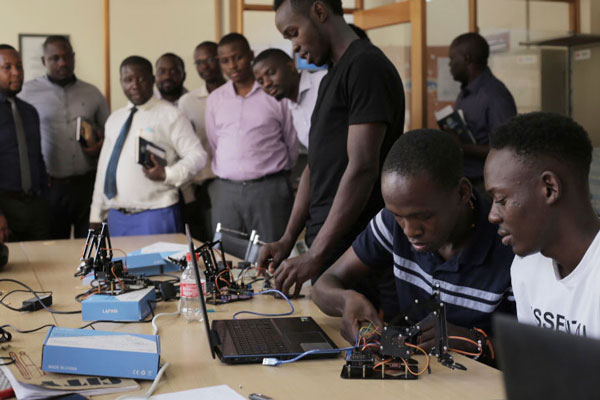
Kampala, Uganda | THE INDEPENDENT | The Uganda Business and Technical Examinations Board (UBTEB) has taken a tough stance against examination malpractice by implementing new guidelines aimed at stemming the vice.
Jalia Nassaza, the manager of vocational Education at UBTEB, says under the guidelines, if a student is caught cheating on any paper, the results for the entire semester will be nullified. This is significant because UBTEB conducts assessments every semester, meaning that a student in a two-year diploma program would have to take four assessments before graduating.
Furthermore, Nassaza notes that the consequences for repeat offenders are even more severe. If a student is caught cheating for a second time, their results for the entire semester will once again be canceled. However, if they are caught for a third time, they will be put on a blacklist and banned from taking any Technical and Vocational Education and Training (TVET) courses that are assessed by UBTEB.
The guidelines are being released at a crucial time, as over 25,000 learners pursuing various programs are due to sit for their April/ May exams. The students will be taking the exams from 257 centers across the country. The exams are set to begin on April 24th.
Onesmus Oyesigye, UBTEB Executive Secretary, notes that these stringent measures are designed to deter cheating and ensure that students are properly evaluated based on their own abilities and knowledge. Oyesigye, adds that the new measures will not only prevent cheating during exams but also help to safeguard the workforce.
Oyesigye states that individuals who cheat their way through assessments are more likely to pose a significant danger in the workplace, as most of the programs are critical to the world of work.
This move by UBTEB signals a commitment to upholding academic integrity and ensuring that graduates are equipped with the necessary skills and knowledge to succeed in their respective fields. It also serves as a warning to students and educators that malpractice will not be tolerated, and that stringent measures will be taken to maintain the integrity of the education system.
Over time, the education system in Uganda has become accustomed to examination malpractice, which has significantly lowered the standards and competence of graduates. While this vice was initially prevalent at the primary and secondary levels, it has since spread throughout the entire education system.
The widespread nature of examination malpractice has led to a loss of trust in the education system, with employers and other stakeholders questioning the qualifications and skills of graduates. This has had a negative impact on the economy, as employers struggle to find adequately skilled workers, and graduates struggle to find employment that matches their qualifications.
It is worth noting that UBTEB is not the only assessment board to implement such measures. Recently, the Uganda Nurses and Midwives Examination Board also took a bold decision to blacklist a student who falsified log books while deployed in health facilities.
UNEB also strengthened its punishments for malpractice under its revised law, imposing heavy penalties on those who engage in, aid, or abet examination malpractice. During the last examination cycle, several cases of malpractice were reported, with some resulting in convictions while others are still undergoing legal proceedings.
Meanwhile, while addressing some assessors, Dr. Wilfred Nahamya, the Deputy Executive Secretary expressed his concern that although the board is determined to combat malpractice, there are institutions where such practices are supported by the heads of those institutions.
Dr. Nahamya cited incidents from Uganda military engineering college, where a student was caught cheating using a sophisticated watch, and when supervisors asked why they allowed this to happen, a lower-ranking soldier noted that he had recieved an order from high ranking officer to give him the notes.
****
URN
 The Independent Uganda: You get the Truth we Pay the Price
The Independent Uganda: You get the Truth we Pay the Price


